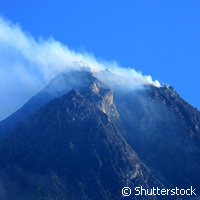EU-funded scientists studying Indonesia's Merapi volcano
A team of EU-funded scientists is studying Indonesia's Merapi volcano, which started erupting on 26 October and has taken the lives of over 30 people. As well as monitoring the eruption, the team is also examining civil protection efforts in the region and investigating the impacts of the eruption on the local economy and the communities. The scientists are part of the MIA-VITA ('Mitigate and assess risk from volcanic impact on terrain and human activities') project, which is funded to the tune of EUR 3.5 million under the Environment Theme of the EU's Seventh Framework Programme (FP7). Some 500 million people worldwide are at risk from volcanoes, and protecting them is a challenge even in wealthy countries. Developing countries face particular difficulties in managing the risk. For example, they may lack the scientific and/or financial resources to monitor all their active volcanoes sufficiently. Furthermore, many people live on the slopes of volcanoes, attracted by the cheap, readily available and fertile land. If the volcano only erupts rarely, both authorities and communities may underestimate the risk posed. The MIA-VITA project is developing a suite of integrated tools and methodologies to help developing countries slash the risks associated with volcanoes. Prevention tools created by the project are based on risk mapping and damage scenarios. Crisis management is another priority for the project; here efforts focus on monitoring and early warning systems plus secure communications networks. Finally, the project aims to reduce the vulnerability of local populations and boost their ability to recover after an eruption. The project partners are focusing their efforts on six volcanoes, chosen because they display a wide range of volcanic hazards and are likely to erupt during the project. In addition, the socio-economic dynamics and civil protection practices differ from one volcano to another. Mount Merapi (whose name translates as 'Mountain of Fire') is one of Indonesia's most active volcanoes, erupting on average every two to four years. Half a million people live in the surrounding area, where they are at risk of pyroclastic flows (when burning clouds of gas, ash and rock rush down the slopes of the volcano), lahars (a high-speed mudslide) as well as falling ash and rocks. Merapi last erupted in 2006, and the first signs that a new eruption was brewing came a few weeks ago when instruments on the volcano detected seismic activity and ground inflation, as the flanks of the mountain bulged outwards. Indonesia's Centre for Volcanology and Geological Hazard Mitigation (CVGHM) is one of the project partners and was behind moves to evacuate the local population once it became clear that an eruption was imminent. MIA-VITA team members from France and the UK will head to Merapi in the next few days to join their Indonesian partners. There they will work to integrate information from remote sensing instruments on board satellites with signals from ground-based instruments. Once the volcano has calmed down, the MIA-VITA consortium will embark on an evaluation of civil protection measures used before and during the eruption and investigate the impacts of the volcano on agriculture, buildings and infrastructures. The social sciences play a key role in the MIA-VITA project. Here, efforts focus on understanding local people's perception of the risk posed by the volcano as well as their perception of decisions made by the government. This is particularly pertinent in Merapi; a number of people ignored the evacuation order issued by the authorities, and some of them died when the volcano erupted. The volcano is not the only natural disaster to have struck Indonesia in recent days; hundreds of people were killed and thousands made homeless when a tsunami swept through the Mentawi islands off the western coast of Sumatra. The European Commission has pledged EUR 1.5 million in humanitarian assistance to the survivors of the tsunami and the volcano.
Countries
Indonesia



